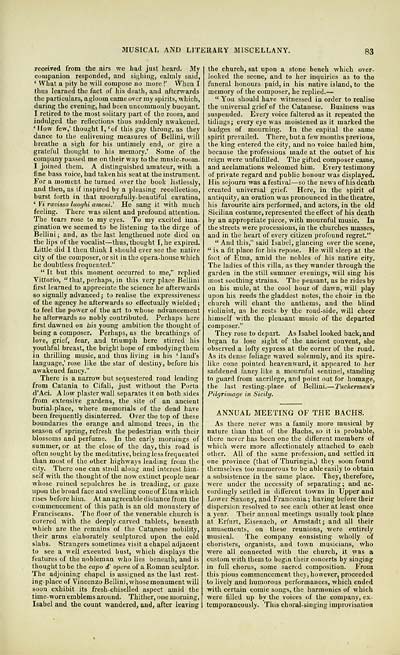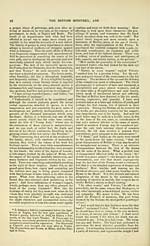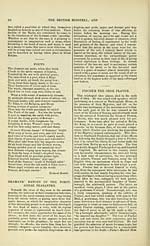Glen Collection of printed music > Printed music > British minstrel, and musical and literary miscellany
(775) Page 83
Download files
Complete book:
Individual page:
Thumbnail gallery: Grid view | List view

MUSICAL AND LITERARY MISCELLANY.
83
received from the airs we bad just heard. My
companion responded, and sighing, calmlv said,
' What a pity he will compose no more !' vVhen I
thus learned the fact of his death, and afterwards
the particulars, agloom came over my spirits, which,
during the evening, had been uncommonly buoyant.
I retired to the most solitary part of the room, and
indulged the reflections thus suddenly awakened.
' How few,' thought I, 'of this gay throng, as they
dance to the enlivening measures of Bellini, will
breathe a sigh for his untimely end, or give a
grateful thought to his memory.' Some of the
company passed me on their way to the music-room.
I joined them. A distinguished amateur, with a
fine bass voice, had taken his seat at the instrument.
For a moment he turned over the book listlessly,
and then, as if inspired by a pleasing recollection,
burst forth in that mournfully- beautiful cavatina,
' Vi ravisso luoghi amcni.' He sang it with much
feeling. There was silent and profound attention.
The tears rose to my eyes. To my excited ima-
gination we seemed to be listening to the dirge of
BeUini ; and, as the last lengthened note died on
the lips of the vocalist — thus, thought I, he expired.
Little did I then think I should ever see the native
city of the composer, or sit in the opera-house which
be doubtless frequented."
" It but this moment occurred to me," replied
Vittorio, " that, perhaps, in this very place Bellini
first learned to appreciate the science he afterwards
so signally advanced ; to realise the expressiveness
of the agency he afterwards so efl'ectually wielded;
to feel the power of the art to whose advancement
he afterwards so nobly contributed. Perhaps here
first dawned on his young ambition the thought of
being a composer. Perhaps, as the breathings of
love, grief, fear, and triumph here stirred his
youthful breast, the bright hope of embodying them
in thrilling music, and thus living in his ' land's
language,' rose like the star of destiny, before his
awakened fancy,"
There is a narrow but sequestered road leading
from Catania to Cifali, just without the Porta
d'Aci. Alow plaster wall separates it on both sides
from extensive gardens, the site of an ancient
burial-place, where memorials of the dead have
been frequently disinterred. Over the top of these
boundaries the orange and almond trees, in the
season of spring, refresh the pedestrian with their
blossoms and perfume. In the early mornings of
summer, or at the close of the day, this road is
often sought by the meditative, being less frequented
than most of the other highways leading from the
city. There one can stroll along and interest him-
self with the thought of the now extinct people near
whose ruined sepulchres he is treading, or gaze
upon the broad face and swelling cone of Etna which
rises before him. At an agreeable distance from the
commencement of this path is an old monastery of
Franciscans. The floor of the venerable church is
covered with the deeply-carved tablets, beneath
which are the remains of the Catanese nobility,
their arms elaborately sculptured upon the cold
slabs. Strangers sometimes visit a chapel adjacent
to see a well executed bust, which displays the
features of the nobleman who lies beneath, and is
thought to be the capo d' opera of a Roman sculptor.
The adjoining chapel is assigned as the last rest-
ing-place of Vincenzo Bellini, whose monument will
soon exhibit its fresh- chiselled aspect amid the
time-worn emblems around. Thither, one morning,
Isabel and the count wandered, and, after leaving
the church, sat upon a stone bench which over-
looked the scene, and to her inquiries as to the
funeral honours paid, in his native island, to the
memory of the composer, he replied. —
" You should have witnessed in order to realise
the universal grief of the Catanese. Business was
suspended. Every voice faltered as it repeated the
tidings; every eye was moistened as it marked the
badges of mourning. In the capital the same
spirit prevailed. There, but a few months previous,
the king entered the city, and no voice hailed him,
because the professions made at the outset of his
reign were unfulfilled. The gifted composer came,
and acclamations welcomed him. Every testimony
of private regard and public honour was displayed.
His sojourn was a festival — so the news of his death
created universal grief. Here, in the spirit of
antiquity, an oration was pronounced in the theatre,
his favourite airs performed, and actors, in the old
Sicilian costume, represented the efi'ect of his death
by an appropriate piece, with mournful music. lu
the streets were processions, in the churches masses,
and in the heart of every citizen profound regret."
" And this," said Isabel, glancing over the scene,
" is a St place for his repose. He will sleep at the
foot of Etna, amid the nobles of his native city.
The ladies of this villa, as they wander through the
garden in the still summer evenings, will sing his
most soothing strains. The peasant, as he rides by
on his mule, at the cool hour of dawn, will play
upon his reeds the gladdest notes, the cboir in the
church will chant the anthems, and the blind
violinist, as he rests by the road-side, will cheer
himself with the pleasant music of the departed
composer."
They rose to depart. As Isabel looked back, and
began to lose sight of the ancient convent, she
observed a lofty cypress at the corner of the road.
As its dense foliage waved solemnly, and its spire-
like cone pointed heavenward, it appeared to her
saddened fancy like a mournful sentinel, standing
to guard from sacrilege, and point out for homage,
the last resting-place of Bellini. — Tuckerman's
Pilgrimage in Sicily,
ANNUAL MEETING OF THE BACKS.
As there never was a family more musical by
nature than that of the Bachs, so it is probable,
there never has been one the dift'erent members of
which were more aflectionately attached to each
other. AH of the same profession, and settled in
one province (that of Thuringia,) they soon found
themselves too numerous to be able easily to obtain
a subsistence in the same place. They, therefore,
were under tie necessity of separating; and ac-
cordingly settled in different towns in Upper and
Lower Saxony, and Franconia ; having before their
dispersion resolved to see each other at least once
a year. Their annual meetings usually took place
at Erfurt, Eisenach, or Arnstadt; and all their
amusements, on these reunions, were entirely
musical. 'the company consisting wholly of
choristers, organists, and town musicians, who
were all connected with the church, it was a
custom with them to begin their concerts by singing
in full chorus, some sacred composition. From
this pious commencement they, however, proceeded
to lively and humorous performances, which ended
with certain comic songs, the harmonies of which
were filled up by the voices of the company, ex-
temporaneously. This choral-singing improvisation
83
received from the airs we bad just heard. My
companion responded, and sighing, calmlv said,
' What a pity he will compose no more !' vVhen I
thus learned the fact of his death, and afterwards
the particulars, agloom came over my spirits, which,
during the evening, had been uncommonly buoyant.
I retired to the most solitary part of the room, and
indulged the reflections thus suddenly awakened.
' How few,' thought I, 'of this gay throng, as they
dance to the enlivening measures of Bellini, will
breathe a sigh for his untimely end, or give a
grateful thought to his memory.' Some of the
company passed me on their way to the music-room.
I joined them. A distinguished amateur, with a
fine bass voice, had taken his seat at the instrument.
For a moment he turned over the book listlessly,
and then, as if inspired by a pleasing recollection,
burst forth in that mournfully- beautiful cavatina,
' Vi ravisso luoghi amcni.' He sang it with much
feeling. There was silent and profound attention.
The tears rose to my eyes. To my excited ima-
gination we seemed to be listening to the dirge of
BeUini ; and, as the last lengthened note died on
the lips of the vocalist — thus, thought I, he expired.
Little did I then think I should ever see the native
city of the composer, or sit in the opera-house which
be doubtless frequented."
" It but this moment occurred to me," replied
Vittorio, " that, perhaps, in this very place Bellini
first learned to appreciate the science he afterwards
so signally advanced ; to realise the expressiveness
of the agency he afterwards so efl'ectually wielded;
to feel the power of the art to whose advancement
he afterwards so nobly contributed. Perhaps here
first dawned on his young ambition the thought of
being a composer. Perhaps, as the breathings of
love, grief, fear, and triumph here stirred his
youthful breast, the bright hope of embodying them
in thrilling music, and thus living in his ' land's
language,' rose like the star of destiny, before his
awakened fancy,"
There is a narrow but sequestered road leading
from Catania to Cifali, just without the Porta
d'Aci. Alow plaster wall separates it on both sides
from extensive gardens, the site of an ancient
burial-place, where memorials of the dead have
been frequently disinterred. Over the top of these
boundaries the orange and almond trees, in the
season of spring, refresh the pedestrian with their
blossoms and perfume. In the early mornings of
summer, or at the close of the day, this road is
often sought by the meditative, being less frequented
than most of the other highways leading from the
city. There one can stroll along and interest him-
self with the thought of the now extinct people near
whose ruined sepulchres he is treading, or gaze
upon the broad face and swelling cone of Etna which
rises before him. At an agreeable distance from the
commencement of this path is an old monastery of
Franciscans. The floor of the venerable church is
covered with the deeply-carved tablets, beneath
which are the remains of the Catanese nobility,
their arms elaborately sculptured upon the cold
slabs. Strangers sometimes visit a chapel adjacent
to see a well executed bust, which displays the
features of the nobleman who lies beneath, and is
thought to be the capo d' opera of a Roman sculptor.
The adjoining chapel is assigned as the last rest-
ing-place of Vincenzo Bellini, whose monument will
soon exhibit its fresh- chiselled aspect amid the
time-worn emblems around. Thither, one morning,
Isabel and the count wandered, and, after leaving
the church, sat upon a stone bench which over-
looked the scene, and to her inquiries as to the
funeral honours paid, in his native island, to the
memory of the composer, he replied. —
" You should have witnessed in order to realise
the universal grief of the Catanese. Business was
suspended. Every voice faltered as it repeated the
tidings; every eye was moistened as it marked the
badges of mourning. In the capital the same
spirit prevailed. There, but a few months previous,
the king entered the city, and no voice hailed him,
because the professions made at the outset of his
reign were unfulfilled. The gifted composer came,
and acclamations welcomed him. Every testimony
of private regard and public honour was displayed.
His sojourn was a festival — so the news of his death
created universal grief. Here, in the spirit of
antiquity, an oration was pronounced in the theatre,
his favourite airs performed, and actors, in the old
Sicilian costume, represented the efi'ect of his death
by an appropriate piece, with mournful music. lu
the streets were processions, in the churches masses,
and in the heart of every citizen profound regret."
" And this," said Isabel, glancing over the scene,
" is a St place for his repose. He will sleep at the
foot of Etna, amid the nobles of his native city.
The ladies of this villa, as they wander through the
garden in the still summer evenings, will sing his
most soothing strains. The peasant, as he rides by
on his mule, at the cool hour of dawn, will play
upon his reeds the gladdest notes, the cboir in the
church will chant the anthems, and the blind
violinist, as he rests by the road-side, will cheer
himself with the pleasant music of the departed
composer."
They rose to depart. As Isabel looked back, and
began to lose sight of the ancient convent, she
observed a lofty cypress at the corner of the road.
As its dense foliage waved solemnly, and its spire-
like cone pointed heavenward, it appeared to her
saddened fancy like a mournful sentinel, standing
to guard from sacrilege, and point out for homage,
the last resting-place of Bellini. — Tuckerman's
Pilgrimage in Sicily,
ANNUAL MEETING OF THE BACKS.
As there never was a family more musical by
nature than that of the Bachs, so it is probable,
there never has been one the dift'erent members of
which were more aflectionately attached to each
other. AH of the same profession, and settled in
one province (that of Thuringia,) they soon found
themselves too numerous to be able easily to obtain
a subsistence in the same place. They, therefore,
were under tie necessity of separating; and ac-
cordingly settled in different towns in Upper and
Lower Saxony, and Franconia ; having before their
dispersion resolved to see each other at least once
a year. Their annual meetings usually took place
at Erfurt, Eisenach, or Arnstadt; and all their
amusements, on these reunions, were entirely
musical. 'the company consisting wholly of
choristers, organists, and town musicians, who
were all connected with the church, it was a
custom with them to begin their concerts by singing
in full chorus, some sacred composition. From
this pious commencement they, however, proceeded
to lively and humorous performances, which ended
with certain comic songs, the harmonies of which
were filled up by the voices of the company, ex-
temporaneously. This choral-singing improvisation
Set display mode to: Large image | Transcription
Images and transcriptions on this page, including medium image downloads, may be used under the Creative Commons Attribution 4.0 International Licence unless otherwise stated. ![]()
| Special collections of printed music > Glen Collection of printed music > Printed music > British minstrel, and musical and literary miscellany > (775) Page 83 |
|---|
| Permanent URL | https://digital.nls.uk/91444245 |
|---|
| Description | Scottish songs and music of the 18th and early 19th centuries, including music for the Highland bagpipe. These are selected items from the collection of John Glen (1833 to 1904). Also includes a few manuscripts, some treatises, and other books on the subject. |
|---|
| Description | The Glen Collection and the Inglis Collection represent mainly 18th and 19th century Scottish music, including Scottish songs. The collections of Berlioz and Verdi collected by bibliographer Cecil Hopkinson contain contemporary and later editions of the works of the two composers Berlioz and Verdi. |
|---|

